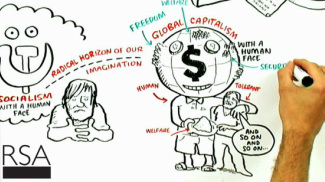 Žižek argues charitable consumption prolongs capitalism's ills. Žižek argues charitable consumption prolongs capitalism's ills. Tags: capitalism, consumption/consumerism, corporations, culture, economic sociology, marketing/brands, marx/marxism, political economy, theory, charity, corporate social responsibility, cultural capitalism, morality, starbucks, žižek, 06 to 10 mins Year: 2010 Length: 10:56 Access: YouTube Summary: In this animated segment of a longer lecture, Slavoj Žižek critiques the cultural dimensions of contemporary capitalism. Žižek begins by stating how capitalism has changed from a dichotomy between production and traditional charity (e.g. Soros earns money by exploiting workers then gives it back to humanist causes), to a form of capitalism that brings the dimensions of morality and consumption together. He offers several examples of this "cultural capitalism," including Starbucks and Tom's Shoes. In each of these instances, the act of consumption and doing good are part of the same process, which has now been universalized throughout capitalism. It is meant to make people (i.e. consumers) feel good about themselves in that they are helping poor people or a degraded environment. However, Žižek argues that by participating in this system, consumers are actually "prolonging the disease ... rather than curing it." He promotes changing the structure rather than this sort of charitable act: "The proper aim is to try and reconstruct society on such a basis that poverty would be impossible and the altruistic virtues have really prevented the carrying out of this aim." He compares this system to slave owners who were kind to their slaves because they prevented oppressed slaves from realizing the core injustice of slavery; in other words, it suggests that we are doing enough to address the system's ills and prevents more significant change. While there is an implicit argument to do away with capitalism here, Žižek explicitly states that 20th century socialism was a "mega catastrophe" and does not promote a return to that system. The clip also works well to initiate critical discussions of corporate social responsibility, Fair Trade, and other social certifications, and begin to imagine what more radical alternatives might look like. Submitted By: Paul Dean
2 Comments
Manuel Franco
7/29/2023 01:57:59 am
I just want to say Thank You to everyone who supported me through the years. My name is Manuel Franco, New Berlin, Wisconsin. My story of how I won the Powerball lottery of $768.4M is a bit of a tale. I have been playing Powerball tickets for 6 years now since I turned 18. I bought my first ticket on my 18 birthday. I was feeling very lucky that day because I had contacted Dr. Odunga Michael to help me with the winning Powerball numbers. I really had that great great feeling that I looked at the camera wanting to wink at it. I only did a tiny part of it and trusted him. He gave me the numbers after I played a couple other tickets along with it for $10. I checked my ticket after the winnings came online and saw the numbers were correct including the Power play. I screamed for about 10 minutes because it felt like a dream. I had won $768.4M. You can check my winning testimony with the lottery officials just with my name search. Thank you Dr Odunga. Well, his email is [email protected] and you can also call or Whats-app him at +2348167159012 so you guys can contact him
Reply
mark hold
7/7/2024 02:57:36 pm
One faithful day as i was watching a video on you tube i saw a comment of one MR PAUL HAVERSACK testifying of this great herbal healer doctor Moses Buba,That helped him enlarge his manhood .i was shocked and happy, so i quickly visited his website and emailed him within 30 mins he got back to me and told me all i need to buy and i did so after 4 days i received his herbal medicine ,he gave me instructions on how to use it ,as i am speaking to you people now after using the cream for just two weeks my manhood size is 10 inches long and 8.0 girth ,,am so happy and grateful for his work in my life thank you so much Doctor Moses buba ,,i also learnt he has cure for LOW SPERM COUNT,PREMATURE EJACULATION,ERECTILE DYSFUNCTION,HIV/AIDS VIRUS,DIABETES 1/2,HERPES DISEASE,CANCER,and lots more
Reply
Leave a Reply. |
Tags
All
.
Got any videos?
Are you finding useful videos for your classes? Do you have good videos you use in your own classes? Please consider submitting your videos here and helping us build our database!
|
 RSS Feed
RSS Feed
